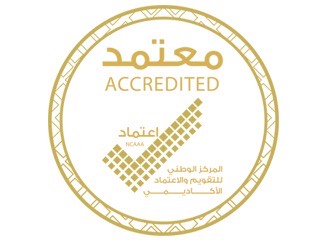The Public Health Program was launched within the College of Applied Medical Sciences, Khamis Mushait. This program represents a significant expansion of the existing Epidemiology Department within the College, aiming to address the growing need for trained professionals in public health. In the academic year 1429-1430, a significant milestone was reached when the College was formally integrated into King Khalid University. This transition followed approval by the Higher Education Council, documented under reference number 5088 on August 7, 1432. As a result of this incorporation, the Public Health Program was granted the authority to award a Bachelor's degree in Public Health. This new academic offering has since played a crucial role in shaping the future workforce of public health specialists, equipping graduates with the necessary skills and knowledge to address public health challenges effectively.

About the Head of the Department
Dr. Rayan Binduhayyim holds a master’s and a Ph.D. from the University of Sheffield in the United Kingdom, specializing in Biomaterials Science and Dental Technology. He has extensive academic and research experience, contributing to curriculum development, educational program enhancement, and active participation in various academic committees. His research interests focus on sustainability in dentistry and health sciences in general, as well as the development of digital medical education and the promotion of interdisciplinary collaboration in healthcare. He also has expertise in creating innovative digital content in dental technology and medical education. He holds a Professional Certificate in e-Learning and Training from the National eLearning Center, reflecting his commitment to advancing modern teaching methodologies and improving the quality of online education.
Soon...
Establishing a research group in the fields of public health in partnership with local and international scientific and research bodies
Mission:
Preparing qualified public health specialists adhered to scientific research standards and community participation to promote public health.
Value:
- Teamwork
- Responsibility
- Transparency
- Precision
Program Goals:
- Preparing trained competencies in public health to meet the needs of the labor market and keep pace with development plans.
- Preparing graduates theoretically and practically and upgrading their technical skills to enable them to continue higher studies.
- To provide graduates with a broad knowledge of important theories and methods of public health and the skills to address community health problems.
- Preparing graduates to conduct research based on scientific grounds in public health.
- Graduating skilled health workers with a commitment to principles, professional capacity, social awareness, and national and international ideas.
- Develop health problem-solving skills.
Fields of the Department of Public Health:
- Epidemiological investigation and control of infectious diseases
- Health Education
- Environmental Health
- Occupational Health
- Food and drinking water safety
Community service areas and partnerships for the department
- Participation in national events
- Participation in international world days
- Partnerships with public health-related bodies
- Health awareness in schools, universities, and institutes
- Providing training courses through associations and clubs
- Presenting lectures to government and private institutions
- Participation in healthcare activities with other parties
The scope of the department’s scientific research
- Epidemiological studies of infectious diseases
- Epidemiological studies of chronic diseases
- Areas of occupational health
- Nutrition and food safety studies
- Health and safety of water
- Emerging diseases
- Diseases surveillance and Epidemiological investigation
- Health administration and health economics
- Studies of vector behavior and control
- Commitment to high ethical standards, Islamic values, and integrity in the workplace
- The ability to identify the health research needs of the community
- Conducting health research correctly, analyzing it, and benefiting from the results
- The ability to design and deliver health education programs for all segments of society
- The ability to employ the latest technology in health informatics to serve the community in the field of public health
- The ability to communicate and present health services effectively
- Can identify and deal with risks affecting public health from epidemic diseases, Chronic diseases, and occupational diseases efficiently to prevent them.
- Can predict and deal with environmental factors that pose a threat to the health and safety of society
- Able to maintain the health and safety of food and its link to public health
Department programs
more ...The Master of Public Health aims to qualify professional specialists and researchers in the fields of public health and community health, who can plan and implement health programs, evaluate…
The program aims to qualify students to become specialists in the fields of public health with skills that will help them develop and present health programs in various fields of public health and…
Objectives:
The Public Health Lab is designed to prepare students and provide them with basic public health skills, which are:
- Familiarity with public health concepts, including diagnosing diseases and health problems in the community and how to prevent them.
- Knowing the natural history of epidemic diseases in terms of their nature, the methods of their spread, and how to prevent and control them.
- Surveillance and monitoring of epidemic diseases at local, regional, and international levels to prevent their spread.
- How to deal with vaccination in terms of their nature, schedules, and modes of administration.
- Knowledge of the meaning of aging and how to deal with it, common diseases, and age-related health problems.
Equipment and devices:
- Digital Blood pressure monitor (electronic)
- Sphygmomanometer(mercury) Blood pressure monitor.
- Glucometer (Blood glucose). Urine Testing Kit (Urine).
Applications:
- Demonstrate the methods of measuring blood pressure by using measuring devices.
- Learn how to measure blood sugar using the device.
- Find out how to measure sugar in urine with the device.
- Find out how to calculate incidence and prevalence.
- Learn about the notification system in disease surveillance
In which students are trained in the necessary skills:
- Water safety and its compliance with health standards and requirements and the efficiency of the treatment process.
- Food safety, complying with health requirements, human consumption suitability free biological, chemical, and physical pollutants.
- Nutritional assessment for different age groups, planning healthy meals, calculating nutritional requirements, and using nutritional MyPyramid.
Objectives: Students are provided with the following information
- Information on the morphology and functions of insects' organs as the largest class of invertebrates.
- Distinguish the orders of different insects based on the displayed morphological information.
- Students learn about the anatomical features of some insects.
- Recognizing the internal and external structures of Insects.
Equipment and devices:
- Multimedia device
- An anatomical microscope
- Optical microscope
Applications:
- Study the shape and structure of the head.
- Study of the thorax (types of leg mutations in the adult phase)
- Study of the abdomen.
- Metamorphosis (examples of non-metamorphic and hypertrophic insects)
- Respiratory system (bronchial orifices and gills
- Plans, Curricula and Quality Committee
- Schedules and Examinations Committee
التقارير
المزيد..



